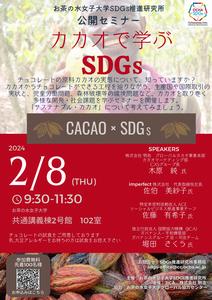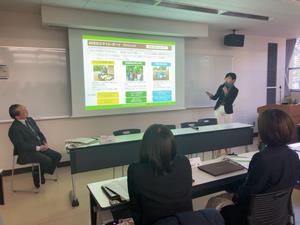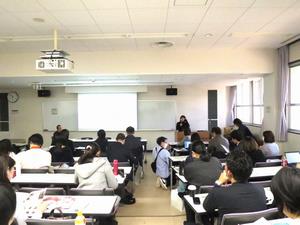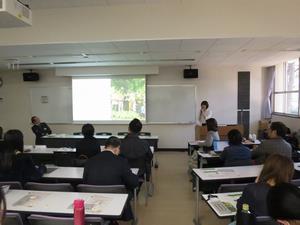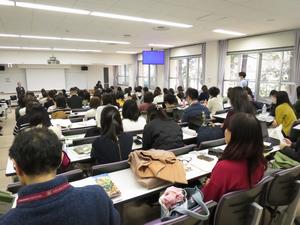- Institute for SDGs Promotion
- We held the public seminar "Learning the SDGs with Cacao"
ページの本文です。
We held the public seminar "Learning the SDGs with Cacao"
2024年2月13日更新
Report on the public seminar "Learning the SDGs with Cacao”
On Thursday, February 8, 2024, Institute or SDGs Promotion held a public seminar "Learning the SDGs with Cacao"(J)with the support of Meiji Co and JICA.
Mr. Jun Kihara from Meiji Co., Ltd. and Ms. Sakura Hotta from JICA were invited as speakers, and Ms. Yukiko Sato from NPO ACE and Ms. Misako Saeki from imperfect Inc. were invited to talk about their efforts to address issues arising from production to distribution of chocolates.
The event was attended by 115 people from the general public, including companies and government agencies, and closed with a great success. Thank you very much for your participation.
Event Outline
【Date】 Thursday, February 8, 9:30 - 11:30 (JST)
【Target】 General public | Students, faculty and staff of Ochanomizu University
【Venue】Room 101, Inter-Faculty Building 2 (共通講義棟2号館101室) *face-to-face
【Program】
1. ‘Did you know that cacao is a fruit?! Meiji's challenge to pursue the possibilities of cacao’
Mr. Jun Kihara, General Manager, CXS Group, Cacao Marketing Department, Global Cacao Business Division, Meiji Co.
2. ‘Efforts to solve child labor problems in the cacao industry’
Ms. Yukiko Sato, Chief of Social Business Promotion Project, ACE (Action against Child Exploitation), NPO (nonprofit organization)
3. ’Aiming for a sustainable cacao industry through collaboration among various stakeholders’
Ms. Sakura Hotta, Law and Justice Team, Governance Group, Governance and Peacebuilding Department, Japan International Cooperation Agency (JICA)
4. ‘Solving Social Issues together with “Sei-katsu-sha”’
Ms. Misako Saeki, President, imperfect Co.
Moderator: Visiting Professor Tetsuo Konaka (Institute for SDGs Promotion)
The seminar was held with the aim of raising awareness of achieving the SDGs by learning the process how chocolates are made from cacao and the various development and social issues surrounding its production, such as the actual situation in producing countries and international trade, child labor problems, and environmental issues such as deforestation.
Four speakers from companies, NPO, and the government agency gave each presentation for 20-25 minutes, followed by an about 20 minutes Q&A session. While how chocolates are created to be attractive products in the market was explained, the speakers also talked about the sacrifices of local people and nature during cacao production, and their actual efforts to address these issues.
Mr. Kihara explained that cacao is a kind of precious fruit that is geographically limited and is grown sensitively, and that only 30% of the fruit is used to make chocolates. He introduced the aspiration of the company to improve the situation of deforestation and the harsh labor conditions of the local people for further production along with the future development of the industry.
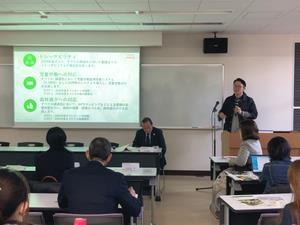 (Mr. Kihara's lecture)
(Mr. Kihara's lecture)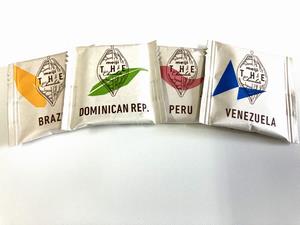 (Sample of MEIJI THE CHOCOLATE)
(Sample of MEIJI THE CHOCOLATE)
*The flavor of cacao from each country of production can be tasted
In her presentation, Ms. Sato of ACE, a non-profit organization, explained that, amidst the current situation of child labor, which is estimated to be 160 million people worldwide (as of 2020), ACE has actually freed 622 children from child labor since 2009 through donations from the sales of chocolate products by major manufacturers and many others. And also, she introduced that they have been working to scale up such efforts through like establishing and promoting the Child Labor Free Zone (CLFZ) system with the Ghanaian government.
Ms. Hotta of JICA (Japan International Cooperation Agency) gave a presentation on the platform creation to eliminate child labor, which is conducted by the government-affiliated organization representative of international cooperation. The 52 member organizations and 102 individuals (as of February 2011) include industry associations, confectionery companies, trading companies, consulting firms, and NGOs, and have been working together on a large scale to solve the problems of child labor, deforestation, and farmer poverty.
The Q&A session for the participants was interspersed with interactive discussions among the panelists. The panelists' views on issues such as the low willingness to pay for ethical but somewhat expensive products, and how effective consumer-based actions can be, were intersected with each other, creating a tense and thought-provoking time.
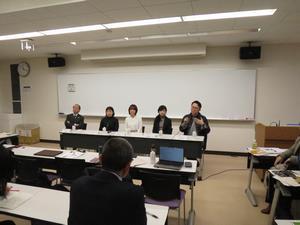 (Panelists responding to questions)
(Panelists responding to questions)
*From right to left:
Mr. Kihara (Meiji), Ms. Sato (ACE),Ms. Saeki (imperfect), Ms. Hotta (JICA), Visiting Professor Konaka
The results of the participants' questionnaires are shown in this year's activity report(J) (pp.42-44). Thank you very much for the many comments showing your sincere interest.
For those of us who are trying to play some kind of role in the real society while bearing the fate of consumers, we are reminded of the weight of co-creating a fair social system. We would like to express our gratitude to all those who attended, to the panelists, and to Meiji and JICA for their support. Thank you very much.





